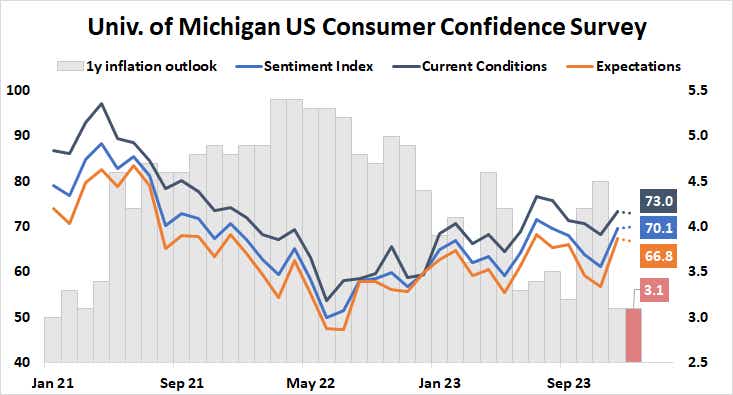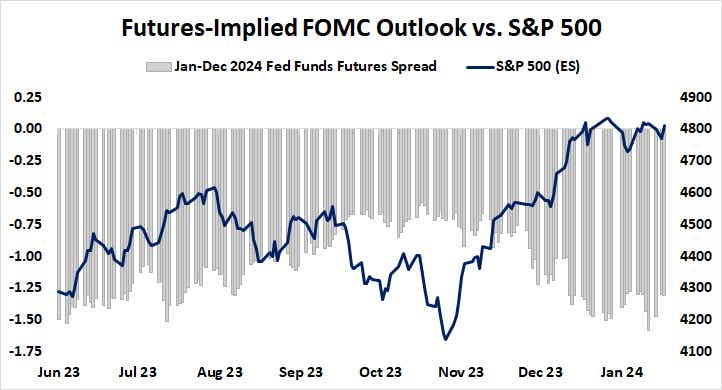The Public’s Confidence in the Economy May Put Equites at Risk

The Public’s Confidence in the Economy May Put Equites at Risk
By:Ilya Spivak
Relative optimism undermines the case for rapid interest rate cuts
- A key survey is set to show U.S. consumer confidence is well-supported in January.
- The two-month rebound in sentiment is driven by expectations for a decline in inflation.
- Stocks and bonds are at risk if the cheery data eats into Fed rate cut speculation.
A gauge of U.S. consumer confidence from the University of Michigan (UofM) is expected to show a relatively upbeat picture in January. Survey respondents’ assessment of current economic conditions and their trajectory over the coming months is seen as similar to the four-month highs recorded in December.
The report’s closely watched inflation expectations metrics seem likewise encouraging. The one-year price growth outlook is seen holding steady at 3.1% while the five-year view idles at 2.9%. That would sustain for another month December’s vast improvement from November’s heady readings.
U.S. consumers cheer as inflation expectations cool
Last month’s report assessed the situation unambiguously: “Consumer sentiment soared [in] December, erasing all declines from the previous four months, primarily on the basis of improvements in the expected trajectory of inflation.” More of the same in January seems like welcome news for an economy overwhelmingly powered by consumption.

Analytics from Citigroup show that U.S. economic data outcomes have converged on analysts’ baseline expectations over recent months. That seems to imply incoming results are likely to hew relatively closely to the consensus view, meaning the UofM report will probably paint a broadly benign picture.
It would echo the message on display in leading purchasing managers’ index (PMI) data, a timelier assessment of the business cycle than perennially lagged gross domestic product (GDP) figures. It reflects a “slow and steady” U.S. economy that has managed to avoid contraction despite deceleration to a near-standstill in the second half of 2023.
Fed interest rate cuts: How many is too many?
This raises an important question for Federal Reserve officials and the traders who watch their every move: Which part of this story demands that the central bank deliver a blistering interest rate cut cycle? As it stands, the markets are pricing in five 25-basis-point (bps) cuts in 2024, with a better-than-even 68% chance of a sixth.
The upswell in rate cut bets was the catalyst powering blistering rallies in stocks and bonds in November and December. Both moves have now stalled as the markets ponder next steps. If U.S. consumer confidence seems well-supported, the case for rapid easing may look less plausible and nudge the markets downward.

Ilya Spivak, tastylive head of global macro, has 15 years of experience in trading strategy, and he specializes in identifying thematic moves in currencies, commodities, interest rates and equities. He hosts Macro Money and co-hosts Overtime, Monday-Thursday. @Ilyaspivak
For live daily programming, market news and commentary, visit tastylive or the YouTube channels tastylive (for options traders), and tastyliveTrending for stocks, futures, forex & macro.
Trade with a better broker, open a tastytrade account today. tastylive, Inc. and tastytrade, Inc. are separate but affiliated companies.
Options involve risk and are not suitable for all investors. Please read Characteristics and Risks of Standardized Options before deciding to invest in options.
tastylive content is created, produced, and provided solely by tastylive, Inc. (“tastylive”) and is for informational and educational purposes only. It is not, nor is it intended to be, trading or investment advice or a recommendation that any security, futures contract, digital asset, other product, transaction, or investment strategy is suitable for any person. Trading securities, futures products, and digital assets involve risk and may result in a loss greater than the original amount invested. tastylive, through its content, financial programming or otherwise, does not provide investment or financial advice or make investment recommendations. Investment information provided may not be appropriate for all investors and is provided without respect to individual investor financial sophistication, financial situation, investing time horizon or risk tolerance. tastylive is not in the business of transacting securities trades, nor does it direct client commodity accounts or give commodity trading advice tailored to any particular client’s situation or investment objectives. Supporting documentation for any claims (including claims made on behalf of options programs), comparisons, statistics, or other technical data, if applicable, will be supplied upon request. tastylive is not a licensed financial adviser, registered investment adviser, or a registered broker-dealer. Options, futures, and futures options are not suitable for all investors. Prior to trading securities, options, futures, or futures options, please read the applicable risk disclosures, including, but not limited to, the Characteristics and Risks of Standardized Options Disclosure and the Futures and Exchange-Traded Options Risk Disclosure found on tastytrade.com/disclosures.
tastytrade, Inc. ("tastytrade”) is a registered broker-dealer and member of FINRA, NFA, and SIPC. tastytrade was previously known as tastyworks, Inc. (“tastyworks”). tastytrade offers self-directed brokerage accounts to its customers. tastytrade does not give financial or trading advice, nor does it make investment recommendations. You alone are responsible for making your investment and trading decisions and for evaluating the merits and risks associated with the use of tastytrade’s systems, services or products. tastytrade is a wholly-owned subsidiary of tastylive, Inc.
tastytrade has entered into a Marketing Agreement with tastylive (“Marketing Agent”) whereby tastytrade pays compensation to Marketing Agent to recommend tastytrade’s brokerage services. The existence of this Marketing Agreement should not be deemed as an endorsement or recommendation of Marketing Agent by tastytrade. tastytrade and Marketing Agent are separate entities with their own products and services. tastylive is the parent company of tastytrade.
tastyfx, LLC (“tastyfx”) is a Commodity Futures Trading Commission (“CFTC”) registered Retail Foreign Exchange Dealer (RFED) and Introducing Broker (IB) and Forex Dealer Member (FDM) of the National Futures Association (“NFA”) (NFA ID 0509630). Leveraged trading in foreign currency or off-exchange products on margin carries significant risk and may not be suitable for all investors. We advise you to carefully consider whether trading is appropriate for you based on your personal circumstances as you may lose more than you invest.
tastycrypto is provided solely by tasty Software Solutions, LLC. tasty Software Solutions, LLC is a separate but affiliate company of tastylive, Inc. Neither tastylive nor any of its affiliates are responsible for the products or services provided by tasty Software Solutions, LLC. Cryptocurrency trading is not suitable for all investors due to the number of risks involved. The value of any cryptocurrency, including digital assets pegged to fiat currency, commodities, or any other asset, may go to zero.
© copyright 2013 - 2025 tastylive, Inc. All Rights Reserved. Applicable portions of the Terms of Use on tastylive.com apply. Reproduction, adaptation, distribution, public display, exhibition for profit, or storage in any electronic storage media in whole or in part is prohibited under penalty of law, provided that you may download tastylive’s podcasts as necessary to view for personal use. tastylive was previously known as tastytrade, Inc. tastylive is a trademark/servicemark owned by tastylive, Inc.